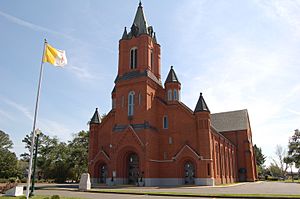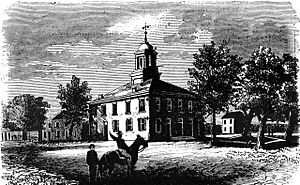Opelousas, Louisiana facts for kids
Quick facts for kids
Opelousas, Louisiana
|
|
|---|---|
| City of Opelousas Ville des Opélousas (French) |
|
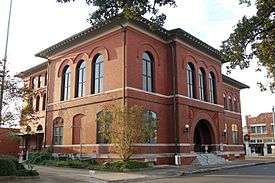
Old Federal Courthouse in Opelousas, listed on the National Register of Historic Places
|
|
| Motto(s):
"Omnia ad Dei Gloriam – All Things to the Glory of God."
|
|
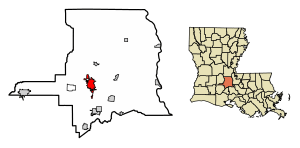
Location of Opelousas in St. Landry Parish, Louisiana.
|
|
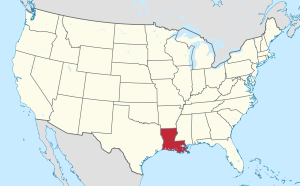
Location of Louisiana in the United States
|
|
| Country | United States |
| State | Louisiana |
| Parish | St. Landry |
| Incorporated | 1821 |
| Named for | Opelousas people |
| Area | |
| • Total | 9.68 sq mi (25.06 km2) |
| • Land | 9.67 sq mi (25.05 km2) |
| • Water | 0.00 sq mi (0.01 km2) |
| Elevation | 69 ft (21 m) |
| Population
(2020)
|
|
| • Total | 15,786 |
| • Density | 1,632.13/sq mi (630.18/km2) |
| Time zone | UTC−6 (CST) |
| • Summer (DST) | UTC−5 (CDT) |
| ZIP code |
70570
|
| Area code(s) | 337 |
| FIPS code | 22-58045 |
| Website | http://www.cityofopelousas.com |
Opelousas is a city in Louisiana, United States. It is the main city of St. Landry Parish. Major roads like Interstate 49 and U.S. Route 190 meet here.
In 2020, Opelousas had about 15,786 people living there. It's known as the center of zydeco music. The city celebrates its history at the Creoles of Color Heritage Folklife Center. This center is part of the new Louisiana African American Heritage Trail. Opelousas is also home to the Evangeline Downs Racetrack and Casino.
The city calls itself "the spice capital of the world." Many famous seasonings are made here, like Tony Chachere's products and Savoie's cajun meats.
Contents
People of Opelousas
Opelousas is home to about 15,786 people. Most residents are African American (77.18%), with a smaller number of White (17.73%) people. There are also smaller groups of Asian, Native American, and Hispanic or Latino people. This mix of cultures makes Opelousas a diverse place.
History of Opelousas
How Opelousas Began
Opelousas gets its name from the Opelousa Native American tribe. This tribe lived in the area long before Europeans arrived.
French traders, known as coureurs de bois (which means "forest trappers and hunters"), came to the Opelousas area in the 1740s. They traded with the Opelousas Indians. In 1763, the French government opened the "Opelousas Country" for new settlers. An official trading post was set up in 1764.
By 1766, the Saint Landry Catholic Church was built. In 1769, about 100 families, mostly French, lived in the area. Later, Spanish governors allowed more settlers to get land. Many people came, including French, Spanish, and Acadians (French settlers from Canada).
After the United States bought Louisiana in 1803, more settlers moved to Opelousas. These included early Creole families like LeBon and Thibodaux. Creole first meant French and Spanish people born in Louisiana. Later, it also included people with mixed French, Spanish, Native American, and African American backgrounds.
In 1805, Opelousas became the main town for the new St. Landry Parish. The city was officially made a city on February 14, 1821.
Opelousas During the Civil War
In the past, the economy of Opelousas relied on large farms where enslaved African Americans worked. This created a unique mix of cultures, including food and music.
During the Civil War, in 1862, Opelousas became the state capital of Louisiana for nine months. This happened after Baton Rouge was taken over by Union troops. The capital moved again in 1863 to Shreveport when Union troops occupied Opelousas.
After the Civil War
After the Civil War ended and slavery was abolished, life changed a lot. In 1868, there was a sad event called the Opelousas massacre. During this time, many African Americans were killed.
Later, in 1872, Opelousas passed rules that limited the freedom of Black Americans. These rules required Black people to have a pass from their employer to enter town. They also had a curfew and couldn't own homes in town unless they worked for a white person. These rules were similar to "Black Codes" used in the South to control freed slaves.
In 1880, the railroad reached Opelousas, which helped the city grow. In the late 1800s and early 1900s, many Catholic orphan children from New York City came to live with families in Opelousas through "Orphan Trains."
In 1920, Black Catholics in Opelousas started their own church, Holy Ghost Catholic Church. It has become the largest Black Catholic church in the United States.
In 1927, Opelousas helped thousands of people who lost their homes during the Great Mississippi Flood of 1927. Many people from flooded areas in Louisiana found safety in Opelousas.
Fun Festivals and Events
Opelousas loves to celebrate! Here are some of its annual events:
- The annual Yambilee Festival started in 1946. It was a harvest festival with competitions, rides, and parades. It is no longer held.
- Since 1982, Opelousas has hosted the Original Southwest Louisiana Zydeco Festival. This festival celebrates Zydeco music with live performances.
- Annual Gumbo Cook-off – held in January.
- Holy Ghost Festival – held the first weekend of November.
- Christmas Lighting of Le Vieux Village – held the first Friday in December.
- Opelousas Imperial Mardi Gras Parade – part of the Mardi Gras celebrations.
- Opelousas Mardi Gras Celebration/Street Dance on Court St. – another Mardi Gras event.
Schools in Opelousas
Opelousas has several schools for students of all ages.
Public Schools
- High Schools: Opelousas Senior High, Northwest High School, and Magnet Academy for Cultural Arts.
- Middle School: Opelousas Junior High.
- Elementary Schools: The city has seven public elementary schools.
- College: Opelousas is also home to a campus of South Louisiana Community College.
Private Schools
Many private schools in Opelousas are connected to religious groups. These include Opelousas Catholic School, Westminster Christian Academy, Apostolic Christian Academy, New Hope Christian Academy, and Family Worship Christian Academy.
Media and News
Opelousas is part of the Lafayette television and radio areas.
- Radio: KOCZ-LP is a local community radio station. It plays music, news, and public affairs programs. The Mix KOGM 107.1FM is another local radio station.
- TV: There are two TV stations based in Opelousas: KDCG-CD (Channel 22) and K39JV (Channel 39).
Economy and Jobs
The main industries in Opelousas are farming, oil, manufacturing, and retail.
- Horse Racing: The Evangeline Downs horse racing track moved to Opelousas in 2003. It provides jobs for over 600 people.
- Spice Company: Opelousas is home to Tony Chachere, a famous Louisiana spice company. They make many seasoning mixes, sauces, and other food products.
- Distribution Center: In 1999, Wal-Mart opened a large distribution center north of the city. It employs over 600 full-time workers and helps the local economy.
Sports in Opelousas
Opelousas used to have its own minor league baseball team called the Opelousas Indians. They played in different leagues from 1907 to 1941. The team played at Elementary School Park.
Famous People from Opelousas
Many talented people have come from Opelousas!
Athletes
- Rod Milburn: A gold medalist in the 1972 Summer Olympics.
- Lloyd Mumphord: An NFL player for the Miami Dolphins, winning two Super Bowls.
- Marvin White: A safety for the Cincinnati Bengals.
- Devery Henderson: A wide receiver for the New Orleans Saints.
- CeeDee Lamb: A wide receiver for the Dallas Cowboys.
- Daniel Baldridge: An offensive tackle for the Jacksonville Jaguars and Tennessee Titans.
- Keon Coleman: A wide receiver for the Buffalo Bills.
Religious Leaders
- W. C. Friley: A Baptist clergyman who helped start the First Baptist Church Opelousas.
- Dominic Carmon: A Roman Catholic bishop.
- Charles Michael Jarrell: A Roman Catholic bishop.
Chefs
- Chef Tony Chachere: Born in Opelousas, his company, Tony Chachere Creole Foods, is based here.
- Chef Paul Prudhomme: A famous chef.
Entertainers
- Rod Bernard: A singer who helped create "swamp pop" music.
- Tex Brashear: A voice actor for cartoons.
- Clifton Chenier: A legendary zydeco musician.
- Richard Eastham: An actor.
- Mabel Sonnier Savoie: An American singer and guitarist.
Historians
- Winston De Ville: A historian and author focused on Colonial Louisiana.
- Carl A. Brasseaux: A historian of French Colonial Louisiana.
Politicians
- Cindy Courville: The first US Ambassador to the African Union.
- Jay Dean: A former mayor of Longview, Texas.
- Cat Doucet: A former Sheriff of St. Landry Parish.
- Gilbert L. Dupré: A state representative and judge.
- H. Garland Dupré: A state and U.S. representative.
- Jacques Dupré: The 8th Governor of Louisiana.
- Ivan L. R. Lemelle: A Federal Judge.
- Charles Nash: An African American Republican Representative.
- André B. Roman: The 9th Governor of Louisiana.
- Albert Tate, Jr.: A Chief Justice of Louisiana.
Other Notable People
- Jim Bowie: A legendary adventurer known for the Bowie knife. He lived in Opelousas for a time.
- Rezin Bowie: Jim Bowie's older brother and the inventor of the Bowie knife.
- Alfred Mouton: A Confederate General during the Civil War.
- Georgia Ann Robinson: The first African American woman to be an officer in the Los Angeles Police Department.
- Summrs: A rapper.
- Harry Swinney: A physicist known for his work in nonlinear dynamics.
Images for kids
See also
 In Spanish: Opelousas para niños
In Spanish: Opelousas para niños


